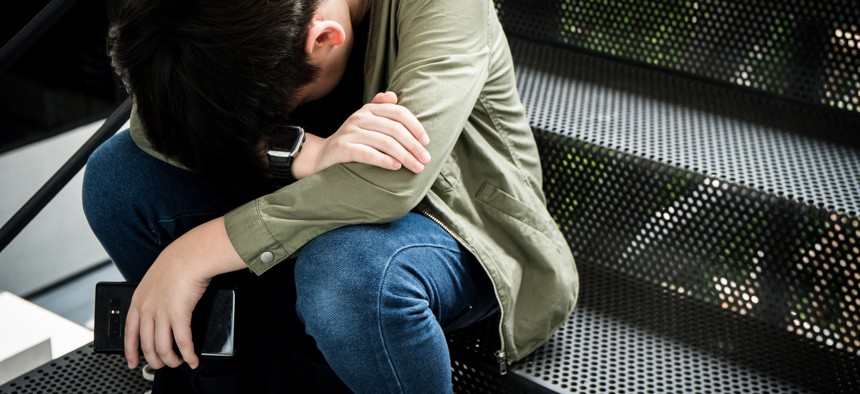Mental health providers warn of growing crisis among youth, oppose state cuts

Kid curls up sitting on staircase with phone in hand. Shutterstock
Mental health providers and advocates from around New York in a state Assembly hearing on Tuesday warned of growing depression, anxiety and suicidal ideas among youth because of the pandemic.
Exposure to illness, death and an ongoing recession that has left New Yorkers hungry and financially insecure has contributed heavily to declining mental health throughout the state. “Many come from the New York City communities hardest hit by COVID-19, with the fewest resources,” Ronald Richter, CEO of the child welfare organization JCCA, said during the hearing.
Young adults, as well as Black and Latino people of various ages, have reported experiencing worsening mental health and increased substance abuse, according to a survey from the Centers for Disease Control and Prevention published last month. More than half of respondents between the ages of 18 to 24 experienced at least one harmful mental health symptom, compared with about 41% of respondents overall, and 1 in 4 seriously considered suicide in the previous 30 days.
For children and teenagers, school closures and social isolation have also fueled depression, anxiety and thoughts about suicide.
“We have learned that the work we’ve done through telehealth has been very helpful for these adolescents and their parents,” said Rosa Gil, president and CEO of Comunilife, which provides mental health services, particularly to Latina teenagers. “Actually, the parents have become much more engaged.”
But effort to reach people struggling with mental health will be worsened as the state withholds 20% of funding for localities and if the state pursues further cuts, organizations testified. Nadia Chait, associate director of policy and advocacy at the Coalition for Behavioral Health, called for more consideration of revenue raisers to avoid cuts as federal aid remains uncertain.
“It's just a very difficult budget time,” state Office of Mental Health Commissioner Ann Marie Sullivan said during the hearing. But she said she was hopeful that ongoing telehealth and federal aid would be able to provide relief despite the fiscal crisis.